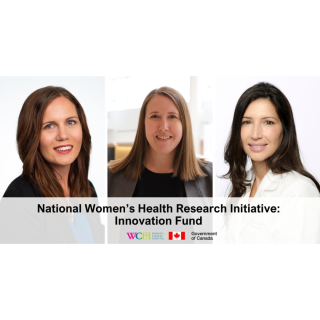|
Connect with PWHR in 2024 ͏ ͏ ͏ ͏ ͏ ͏ ͏ ͏ ͏ ͏ ͏ ͏ ͏ ͏ ͏ ͏ ͏ ͏ ͏ ͏ ͏ ͏ ͏ ͏ ͏ ͏ ͏ ͏ ͏ ͏ ͏ ͏ ͏ ͏ ͏ ͏ ͏ ͏ ͏ ͏ ͏ ͏ ͏ ͏ ͏ ͏ ͏ ͏ ͏ ͏ ͏ ͏ ͏ ͏ ͏ ͏ ͏ ͏ ͏ ͏ ͏ ͏ ͏ ͏ ͏ ͏ ͏ ͏ ͏ ͏ ͏ ͏ ͏ ͏ ͏ ͏ ͏ ͏ ͏ ͏ ͏ ͏ ͏ ͏ ͏ ͏ ͏ ͏ ͏ ͏ ͏ ͏ ͏ ͏ ͏ ͏ ͏ ͏ ͏ ͏ ͏ ͏ ͏ ͏ ͏ ͏ ͏ ͏ ͏ ͏ ͏ ͏ ͏ ͏ ͏ ͏ ͏ ͏ ͏ ͏ ͏ ͏ ͏ ͏ ͏ ͏ ͏ ͏ ͏ ͏ ͏ ͏ ͏ ͏ ͏ ͏ ͏ ͏ ͏ ͏ ͏ ͏ ͏ ͏ ͏ ͏ ͏ ͏ ͏ ͏ ͏ ͏ ͏ ͏ ͏ ͏ ͏ ͏ ͏ ͏ ͏ ͏ ͏ ͏ ͏ ͏ ͏ ͏ ͏ ͏ ͏ ͏ ͏ ͏ ͏
|
Dear PWHR Subscribers,
As we conclude the fall season, we are thrilled to share this edition that highlights the latest news from PWHR and our partners in women's health research:
Register now for Menopause (mis)Information, part of the PWHR 2024-2025 Seminar Series! Join us on November 14th for this expert panel to combat menopause misinformation and stigma, and provide science-based and community informed resources.
Best regards, Tamil Kendall, PhD Director, Partnership for Women’s Health Research Canada
|
|
| |
Women and Children's Health Research Institute

| | | |
Study offers Hope of a New Treatment for Rare Endometrial Cancer
Researchers at the University of Alberta, in collaboration with scientists from the University of Saskatchewan and the University of British Columbia, discovered that digoxin, a drug commonly used for congestive heart failure, is effective in treating a rare and aggressive form of endometrial cancer. The findings, published in Gynecologic Oncology, were unexpected.
Cheng-Han Lee, the senior author and associate professor in the Department of Laboratory Medicine & Pathology and Sawin-Baldwin Chair in Ovarian Cancer, mentioned that the anti-cancer properties of digoxin were identified over a decade ago, but its effectiveness was inconsistent across different cancers, hindering clinical application.
The study, conducted as the master’s thesis of graduate student Pooja Praveen Kumar, utilized surgical tissue samples from patients with highly aggressive endometrial cancer to develop three-dimensional lab cell models. Using a robotic platform at the Saskatchewan Cancer Agency, the researchers tested numerous drug compounds to control the cancer cells. Digoxin, along with other drugs in the cardiac glycoside compound family, emerged as a promising candidate. This is significant because current chemotherapy for endometrial cancer is ineffective against this aggressive subtype, known as dedifferentiated endometrial carcinoma (DDEC).
These findings underscore the potential of repurposing existing drugs to address challenging cancers, highlighting the importance of ongoing research and collaboration among institutions.
|
| |
|
| |
Women's College Hospital Research Institute
| |

| | |
Improving Access to Care for Endometriosis
Women’s College Hospital’s (WCH) Drs. Brittany Rosenbloom, Rachael Bosma and Tania Di Renna are leading the way in efforts to advance care and early screening for those living with, or at risk of, endometriosis. Dr. Di Renna, the inaugural director of the Toronto Academic Pain Medicine Institute (TAPMI) program, underscores a critical gap in chronic pain research, particularly concerning female-specific health issues such as pregnancy, fertility, menstruation, and menopause. She emphasizes that chronic pelvic pain, a debilitating condition affecting approximately 26% of the global female population, represents a substantial unmet need. Despite ongoing efforts, disparities in access to services remain a significant challenge. With over $500,000 in funding from the Canadian Institutes of Health Research (CIHR) through a specific call for women’s health, Dr. Brittany Rosenbloom expresses her enthusiasm about leading this project alongside her co-principal investigators. She views this initiative as a pivotal opportunity to advance women’s health in Canada and improve the lives of those living with endometriosis. Dr. Rosenbloom, an associate scientist at WCH Research and Innovation Institute and a clinical and health psychologist at TAPMI, is thrilled to be at the forefront of this initiative. The project will also involve collaboration with primary care clinicians and patients to co-create a toolkit for supporting early screening and intervention. Dr. Bosma shares her excitement about working with a powerhouse team of pelvic pain specialists, gynecologists, researchers, and individuals with lived experience who are passionate about making a difference in women’s health. This initiative will also involve collaborating with primary care clinicians and patients to co-create a toolkit for supporting early screening and intervention. To learn more about TAPMI’s work, click here.
|
| |
|
| |
Women's Health Research Institute
| |

| | |
Healthy Brain Aging and Perimenopause Podcast
To wrap up Menopause Awareness Month, the WHRI's @WomensResearch Podcast features an enlightening episode on healthy brain aging with Dr. Cindy Barha.
Dr. Barha, a researcher with expertise in behavioral neuroscience, neuroendocrinology, and exercise neuroscience, discusses how exercise promotes brain health in postmenopausal women. She highlights the need for more research on how exercise influences brain health earlier in life and during midlife. Dr. Barha's work aims to develop personalized exercise interventions to enhance cognition and neuroplasticity, using both human trials and rodent models. She focuses on factors like biological sex and genetics, and critical neuroendocrine transition periods such as pregnancy and midlife. The podcast also touches on the benefits of aerobic exercise for cognitive health, while noting that the effects of high-intensity training (HIT) on menopause and perimenopause remain unclear. Tune in to gain valuable insights on this important topic!
|
| |
|
|




